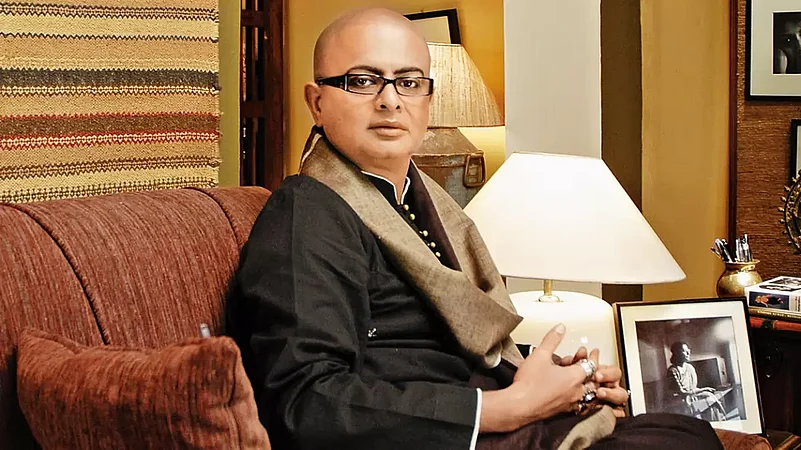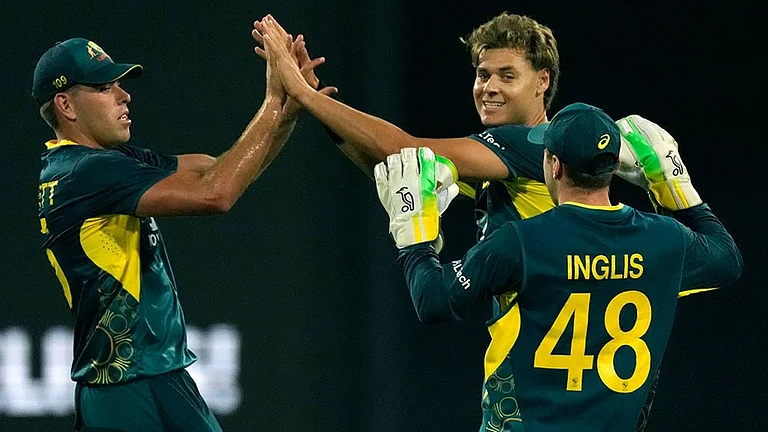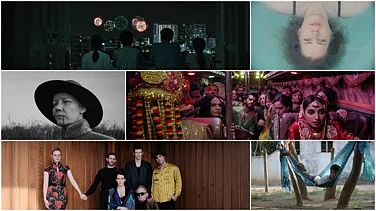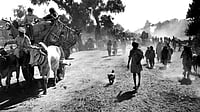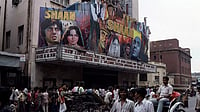It was an odd relationship in many ways. By the time Rituparno, the scruffy, lightning-quick copywriter I knew, became Rituparno, the auteur, our interactions literally hung on a line.
We worked through innumerable film concepts and subtitles on the telephone—his sleeping tablet-filled nights usually wound up at 6:30 in the morning and he would be wide awake contemplating the latest project or the latest line of dialogue and waiting for me to be out of bed to turn his Bengali into English. He knew my schedule very well—the phone would ring at 7 AM for half-an-hour of in-depth discussion, followed by a half an hour break for my bath, and then the conversation would resume again until I told him it was time for me to get ready for work.
Ours was a world of limited conversations and information on a need-to-know basis. Or rather, it had become so. From knowing Rituparno in Response advertising and working with him on his first scripts while listening to outpourings on his love life or lack of it, his had slowly become a closed Page Three world in which phones were not answered unless required. Gifts, though, were given often, and with generosity. He launched five of my books, dressing, for him, soberly in a kurta-pyjama on four of the occasions.
Occasionally, I was summoned to meetings at his house and ferried there in an SUV with cushions covered in raw silk to loll on at the back. These meetings happened either at his house or sometimes at a place called Azadgarh where he had done up one floor in star guest house style so that he could house out-of-town actors and save on film budgets. I suspect he also used it as a weekend getaway of sorts.

Satyajit Ray had been a steady influence—from the red cloth-bound account books in which he wrote his scripts, to the piles of books that began to accumulate in his newly decorated drawing room, under tables, on tables, arranged deliberately to catch the eye, many of which he had no time to read unless they pertained to his work. For his period pieces, he went looking for props in the ancient Bhowanipore shop that Ray had frequented and which was on its last legs but filled with curiosities. And when he directed children—notably in Khela—he chose them with a ‘what would Ray have done’ undercurrent.
As time moved on and his reputation grew, Rituparno thought of a biography. A biographer would follow him from set to set catching every nuance of his work, a kind of Andrew Robinson with myself playing the role—however, he told me he had the distinct feeling that I did not take his work seriously. That, I thought, was possibly true. I had known him far too well at one time. Though by the time we had got to Andrew Robinson, I had become deliberately non-curious, trying not to push myself into shoots or clamouring for insider information. Once he threatened to make me conduct Shakespearean elocution classes for Amitabh Bachchan during The Last Lear, but that was an idle threat.
What I did enjoy was the interaction, even though it was mostly over the telephone line, the exchange of ideas and the tapping of my knowledge of English, history and all the other odds and ends that I could supply him with while he taught me his Bengali. We were in a gradual exchange of language and nuance—how, for example, would an upper- class English family sit down to dine?
It was an association that evolved from Hirer Angti to Satyanweshi, reflecting perhaps the way his life evolved. From someone who simply loved the language and adored visual drama, he had become someone who needed to create drama through his own life to make a gender— rather than a cinematic—statement.
From the beginning, there was a touch of unease with the man-woman relationships in his work—though that may have occurred to me because I knew Rituparno. He began to refer to himself as a womanist, someone who made woman-sensitive films. His stories were deliberately chosen with that slant. There were the arguments, the uncomfortable sexuality and neglect, backed by the experiments with framing and one bold venture into black and white in direct Ray mode in Dosar. He also went into Hindi and English–The Last Lear was a mix of the two, again written over the telephone.
Adding to my list of reservations was cross-examining him on motivation—why this story and not another, or why choose Aishwarya Rai when whispers suggested that he had originally considered Nandita Das? Of course, there was the need to prove himself as the director of stars beyond Bengal and reach out to film festivals worldwide, but it resulted in a host of projects explored and discarded—Mahabharata from Draupadi’s viewpoint, or the Bhawal Sanyasi Case. Some faltered for the lack of funding or interest; the others were pushed aside for future reference.

The trouble, of course, was that there would be no future, though none of us anticipated that then—if I had, I might have questioned more. There were absurdities like stumbling on the stairs in a dhoti-salwar and breaking his leg, or indigestion from the biryani and pakoras at too many film shoots, followed by the hints of hormone therapy.
The films continued—Antarmahal, Sunglass, Asukh, Abohoman, Shob Charitro Kalponik, then, gradually, as the media began to talk about his increasingly transgender identity, Arekti Premer Galpo, directed by Kaushik Ganguly, and Chitrangada. He acted in both, as Chapal Bhaduri in the first, and as a dancer version of himself in the second.
I had a transgender friend in Scotland and Rituparno often asked me about him, joking that I had more queer friends than he did. Then he abruptly put an end to his hormone tinkering, possibly because the relationship that had moved him to make the sacrifice had fizzled out—he mentioned no names. In that ‘has he’-‘hasn’t he’ atmosphere, it began to dawn on him that he was possibly losing his base of fans, the Bengali middle-class families who did not relate to queer themes.
Satyanweshi was, as the film world knows, his last work. Normally, before a film, he would be calling me with questions on language and colonial background. In this case, there was silence. I heard of the project from the media with his choice of Sujoy Ghosh as Byomkesh. When he finally called, he said he hadn’t been well, pancreatitis aggravated by his sugar issues. He was going to start shooting at Kabardanga, and if I had any intentions of watching the shoot, I should be ready to spend the whole day there. As usual, I refused. In any case, the name of the place made me uneasy—either the fact that he was shooting in an old graveyard, or perhaps the sense of doom came from what followed.
It ended suddenly with a still form in bed looking more peaceful than I had seen him in a long while. That was the first time I was grateful to a virus—since I hadn’t gone to work, I was able to drag myself to his house when I heard the news. The silence was eventually followed by a cortege, a lying in state at Nandan and a crash of gun salutes—all the elements of a State funeral, which he would most probably have laughed at.
For a while after his death, the bulk of Rituparno’s work was ignored in favour of his queer films. Now, gradually, the rest of his filmography is being re-examined through a host of books and explorations. Ten years have yet to see his place filled in the world of Bengali film.
As for me, if the phone rings at 7 AM now, I am more likely to wonder if it’s a family emergency. The sense of looking forward to an exchange of ideas with a friend is over, buried in the reels of time.
Anjana Basu has published nine novels and two books of poetry. She has written the subtitles for many of Rituparno Ghosh’s films






